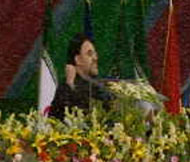 Explore Post-Cold War Conflict Over Nuclear Technology Explore Post-Cold War Conflict Over Nuclear Technology
Target Grade Levels:
Grades 7-12
Themes:
Cold War and Beyond, Nuclear Technology, Foreign Relations
The Activity
Relevant National Standards
Cross-Curricular Activities
Ties to Literature


The Activity


Note: This activity is designed to be used in conjunction
with studies on the Cold War.
Nuclear technology can be used for both productive and
destructive purposes. Because of this fact, it isn’t
always clear for what purposes a country may seek to develop
a nuclear program. While the United Nations’ inspection
system is supposed to safeguard against the use of nuclear
technology to create weapons, the activities of some nuclear
programs are difficult to track, preventing U.N. enforcement
from being completely reliable.
Have the class compare and contrast the nuclear threat
of today’s technology “war” with the
Cold War. Who are the nuclear threats during each time
period? How are such threats dealt with? Ask students to
use a Venn diagram
to organize their ideas. (For a simple
Venn Diagram model, please see the example provided by
the San Diego County Office of Education.
www.sdcoe.k12.ca.us/score/actbank/tvenn.htm
One circle can represent the Cold War, and the other today’s
technology war. The place where the circles overlap should
hold ideas about the characteristics that these two periods
have in common, and the areas of the circles outside of
this overlap can feature characteristics that make each
period distinct.
Have students first complete the Cold War side of the
diagram based on their previous studies. To help students
build their knowledge of current circumstances, have them
work in pairs to review these resources:
How to Become a Nuclear
Superpower
pbs.org/frontlineworld/stories/iran403/howto.html
Explore the steps that countries have taken toward joining the world's nuclear-armed club.
The
U.S. State Department's Strategic Plan: Weapons of Mass Destruction
www.state.gov/s/d/rm/rls/dosstrat/2004/23504.htm#wmd
Read how the U.S. defines weapons of mass destruction, as well as the strategies used to combat them.
Nuclear Underground:
The Guru
pbs.org/frontlineworld/stories/nuclear/
Review an actual case of nuclear smuggling.
When pairs have completed their diagrams, provide them with a few minutes to present what they learned to at least one other group.
Next, show students the approximately 25-minute video, "Going Nuclear." (Note: This story can be viewed online in its entirety. A free transcript is also available to assist with planning. Please see the "Related Story" box at left for details.) To focus student viewing, ask them to take notes on why Iran believes it should have a nuclear program and why some in the international community are against it.
After the video, ask students if they think Iran should have a nuclear program. Why or why not? Is it fair for the U.S. to have nuclear weapons and to then ask other countries not to? Why or why not?
back to top


Relevant National Standards


These standards are drawn from "Content Knowledge," a compilation
of content standards and benchmarks for K-12 curriculum
by McRel (Mid-continent Research for Education and Learning),
at http://www.mcrel.org/standards-benchmarks/.
U.S. History Standard 30
Understands developments in
foreign policy and domestic politics
Level IV, Benchmark 5
Understands the influence of
U.S. foreign policy on international events
World History Standard 44
Understands the search for
community, stability, and peace in an interdependent world
Level III, Benchmark 4
Understands instances of political
conflict and terrorism in modern society
Level IV, Benchmark 6
Understands the role of ethnicity,
cultural identity, and religious beliefs in shaping economic
and political conflicts across the globe
back to top
|